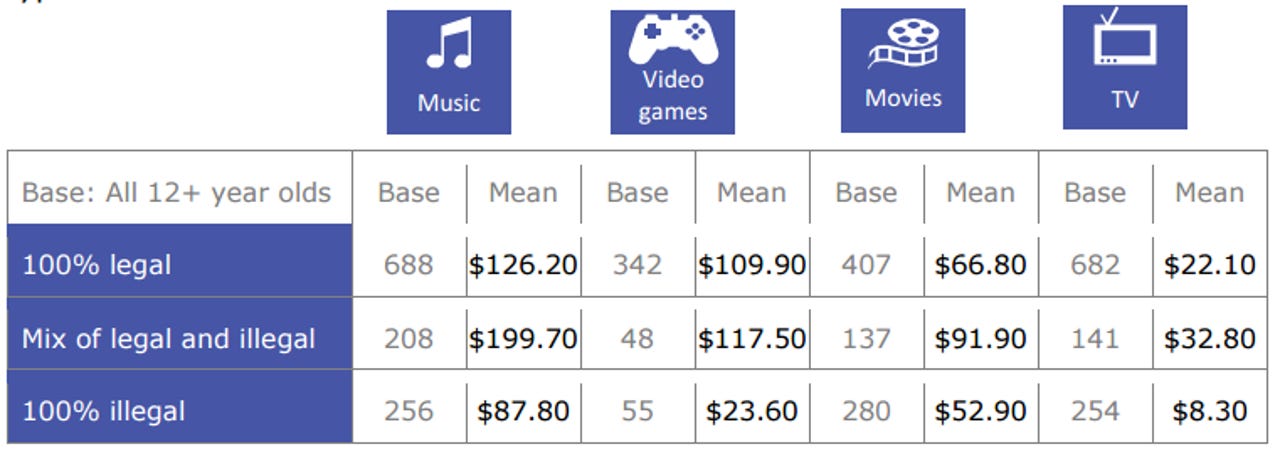People who pay for content but also infringe copyright spend more

Consumers who flirt with the morally ambiguous line of content consumption spend more money, according to a survey released by the Australian Department of Communications.
Over a three-month period among respondents aged 12 and over, the survey found that those who consumed a mixture of copyright-infringing and non-infringing content spent on average AU$200 on music, AU$118 on video games, AU$92 on movies, and AU$33 on TV content. Consumers who only consumed non-infringing content spent only AU$126 on music, AU$110 on video games, AU$67 on movies, and AU$22 on TV; whereas pure copyright-infringing content consumers spent a mere AU$88 on music, AU$24 on video games, AU$53 on movies, and AU$8 on TV content.

However, the survey also found that the majority of spending on music and movies was not on the content items themselves.
"For both music and movies, the majority of the average spend was not from purchases of either digital or physical copies. In the case of music, this primarily consisted of concerts and gigs, and in the case of movies, this primarily consisted of going to the cinema," it said.
Latest Australian news
The Department of Communications survey found that 86 percent of people who consumed music, video gaming, movie, or TV content digitally had consumed some of it for free, with 47 percent consuming it all for free, giving a final result of 52 percent of all internet users in Australia consuming free content. However, the survey said that paid content did not guarantee an absence of copyright infringement, and free content did not always infringe on copyright -- with 28 percent of those who had paid for music or movie content having consumed copyright-infringing content.
In absolute terms, the survey said that during the first quarter of 2015, 254 million music tracks, 95 million movies, 82 million TV programs, and 9 million video games were consumed that infringed on copyright.
A majority of survey respondents said that they would pay for a music subscription service that charged AU$5 per month, and AU$10 per month for a movie subscription service.
Only 5 percent of respondents said that nothing would make them stop consuming copyright-infringing content.
In comparison to a similar survey conducted in the United Kingdom, Communications Minister Malcolm Turnbull said that 43 percent of Australians who had consumed digital content in the surveyed period had consumed at least one of those files illegally, compared to only one-fifth in the UK -- but the UK survey had shown an increase in the take-up of legal services since 2013.
"The results also underscore the importance of governments working with industry to address infringement issues, and that a range of measures are needed to properly tackle the problem," Turnbull said.
Last month, the Australian parliament passed legislation to allow rights holders to obtain court orders to block overseas websites, such as The Pirate Bay, that are found to contain copyright-infringing material, or facilitate access to copyright-infringing material.
The parliament had just three months to consider the legislation, and the Senate committee examining the legislation held just one hearing where one Labor senator and one Coalition senator attended.
Turnbull said today that the legislation is only part of the solution to battling piracy.
"Rights holders' most powerful tool to combat online copyright infringement is making content accessible, timely, and affordable to consumers," Turnbull said on Wednesday.